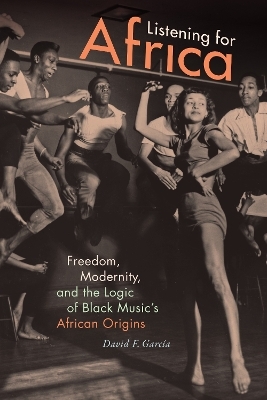
Listening for Africa
Freedom, Modernity, and the Logic of Black Music's African Origins
Seiten
2017
Duke University Press (Verlag)
978-0-8223-6370-5 (ISBN)
Duke University Press (Verlag)
978-0-8223-6370-5 (ISBN)
David F. Garcia examines the work of a wide range of musicians, dancers, academics, and activists between the 1930s and the 1950s to show how their belief in black music's African roots would provide the means to debunk racist ideologies, aid decolonization of Africa, and ease racial violence.
In Listening for Africa David F. Garcia explores how a diverse group of musicians, dancers, academics, and activists engaged with the idea of black music and dance’s African origins between the 1930s and 1950s. Garcia examines the work of figures ranging from Melville J. Herskovits, Katherine Dunham, and Asadata Dafora to Duke Ellington, Dámaso Pérez Prado, and others who believed that linking black music and dance with Africa and nature would help realize modernity’s promises of freedom in the face of fascism and racism in Europe and the Americas, colonialism in Africa, and the nuclear threat at the start of the Cold War. In analyzing their work, Garcia traces how such attempts to link black music and dance to Africa unintentionally reinforced the binary relationships between the West and Africa, white and black, the modern and the primitive, science and magic, and rural and urban. It was, Garcia demonstrates, modernity’s determinations of unraced, heteronormative, and productive bodies, and of scientific truth that helped defer the realization of individual and political freedom in the world.
In Listening for Africa David F. Garcia explores how a diverse group of musicians, dancers, academics, and activists engaged with the idea of black music and dance’s African origins between the 1930s and 1950s. Garcia examines the work of figures ranging from Melville J. Herskovits, Katherine Dunham, and Asadata Dafora to Duke Ellington, Dámaso Pérez Prado, and others who believed that linking black music and dance with Africa and nature would help realize modernity’s promises of freedom in the face of fascism and racism in Europe and the Americas, colonialism in Africa, and the nuclear threat at the start of the Cold War. In analyzing their work, Garcia traces how such attempts to link black music and dance to Africa unintentionally reinforced the binary relationships between the West and Africa, white and black, the modern and the primitive, science and magic, and rural and urban. It was, Garcia demonstrates, modernity’s determinations of unraced, heteronormative, and productive bodies, and of scientific truth that helped defer the realization of individual and political freedom in the world.
David F. Garcia is Associate Professor of Ethnomusicology at the University of North Carolina, Chapel Hill, and the author of Arsenio Rodríguez and the Transnational Flows of Latin Popular Music.
Preface ix
Acknowledgments xi
Introduction 1
1. Analyzing the African Origins of Negro Music and Dance in a Time of Racism, Fascism, and War 21
2. Listening to Africa in the City, in the Laboratory, and on Record 74
3. Embodying Africa against Racial Oppression, Ignorance, and Colonialism 124
4. Disalienating Movement and Sound from the Pathologies of Freedom and Time 173
5. Desiring Africa, or Western Civilization's Discontents 221
Conclusion. Dance-Music as Rhizome 268
Notes 277
Bibliography 323
Index 345
| Erscheinungsdatum | 19.08.2017 |
|---|---|
| Zusatzinfo | 23 illustrations |
| Verlagsort | North Carolina |
| Sprache | englisch |
| Maße | 152 x 229 mm |
| Gewicht | 499 g |
| Themenwelt | Kunst / Musik / Theater ► Musik ► Allgemeines / Lexika |
| Kunst / Musik / Theater ► Musik ► Musiktheorie / Musiklehre | |
| Kunst / Musik / Theater ► Theater / Ballett | |
| Sachbuch/Ratgeber ► Sport ► Tanzen / Tanzsport | |
| Sozialwissenschaften ► Ethnologie | |
| Sozialwissenschaften ► Soziologie | |
| ISBN-10 | 0-8223-6370-4 / 0822363704 |
| ISBN-13 | 978-0-8223-6370-5 / 9780822363705 |
| Zustand | Neuware |
| Haben Sie eine Frage zum Produkt? |
Mehr entdecken
aus dem Bereich
aus dem Bereich
die Geschichte der Schallplatte
Buch | Hardcover (2024)
Prestel (Verlag)
CHF 51,90
Buch | Softcover (2024)
Nomos (Verlag)
CHF 39,95


